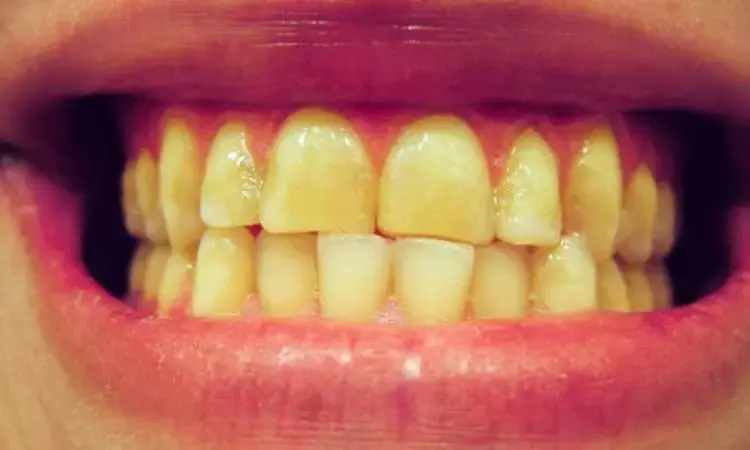- Home
- Medical news & Guidelines
- Anesthesiology
- Cardiology and CTVS
- Critical Care
- Dentistry
- Dermatology
- Diabetes and Endocrinology
- ENT
- Gastroenterology
- Medicine
- Nephrology
- Neurology
- Obstretics-Gynaecology
- Oncology
- Ophthalmology
- Orthopaedics
- Pediatrics-Neonatology
- Psychiatry
- Pulmonology
- Radiology
- Surgery
- Urology
- Laboratory Medicine
- Diet
- Nursing
- Paramedical
- Physiotherapy
- Health news
- Fact Check
- Bone Health Fact Check
- Brain Health Fact Check
- Cancer Related Fact Check
- Child Care Fact Check
- Dental and oral health fact check
- Diabetes and metabolic health fact check
- Diet and Nutrition Fact Check
- Eye and ENT Care Fact Check
- Fitness fact check
- Gut health fact check
- Heart health fact check
- Kidney health fact check
- Medical education fact check
- Men's health fact check
- Respiratory fact check
- Skin and hair care fact check
- Vaccine and Immunization fact check
- Women's health fact check
- AYUSH
- State News
- Andaman and Nicobar Islands
- Andhra Pradesh
- Arunachal Pradesh
- Assam
- Bihar
- Chandigarh
- Chattisgarh
- Dadra and Nagar Haveli
- Daman and Diu
- Delhi
- Goa
- Gujarat
- Haryana
- Himachal Pradesh
- Jammu & Kashmir
- Jharkhand
- Karnataka
- Kerala
- Ladakh
- Lakshadweep
- Madhya Pradesh
- Maharashtra
- Manipur
- Meghalaya
- Mizoram
- Nagaland
- Odisha
- Puducherry
- Punjab
- Rajasthan
- Sikkim
- Tamil Nadu
- Telangana
- Tripura
- Uttar Pradesh
- Uttrakhand
- West Bengal
- Medical Education
- Industry
Is there any association between sleep bruxism and temporomandibular joint dysfunction?

There is a positive association that exists between sleep bruxism and temporomandibular joint dysfunction (TMD) suggests a new study published in the Journal of Craniomandibular & Sleep Practice
A study was conducted to answer the question, “Is there any association between sleep disorder and temporomandibular joint dysfunction (TMD) in adults?”
In the literature search, 3425 articles were found. After the exclusion of duplicates, 2752 were selected for reading the title and abstract, of which 26 were read in full, and 18 met eligibility criteria.
Based on a systematic review of 18 clinical studies (with mostly low risk of bias), the authors reported that the association between sleep bruxism and the development of temporomandibular joint dysfunction (TMD) in adults is unclear owing to conflicting results. However, positive associations exist between TMD and the following conditions: obstructive sleep apnea, insomnia, snoring, and gastroesophageal reflux.
At this moment, the association of sleep bruxism with TMD is unclear; however, a host of other conditions show a positive association with TMD. The results point toward the importance of comprehensive patient examination and interdisciplinary care in the effective management of TMD.
The association of sleep bruxism with TMD is controversial. While, for obstructive sleep apnea, insomnia, snoring, and gastroesophageal reflux, the analyzed studies showed a positive association.
Reference:
Amanda Tereza Pala Mendes, Juliana Dias Corpa Tardelli, André Luís Botelho & Andréa Cândido Dos Reis (2022) Is there any association between sleep disorder and temporomandibular joint dysfunction in adults? – A systematic review, CRANIO®, DOI: 10.1080/08869634.2022.2154022
Keywords:
Amanda Tereza Pala Mendes, Juliana Dias Corpa Tardelli, André Luís Botelho & Andréa Cândido Dos Reis, association, between, sleep, disorder, temporomandibular, joint, dysfunction, adults, The Journal of Craniomandibular & Sleep Practice
Dr. Shravani Dali has completed her BDS from Pravara institute of medical sciences, loni. Following which she extensively worked in the healthcare sector for 2+ years. She has been actively involved in writing blogs in field of health and wellness. Currently she is pursuing her Masters of public health-health administration from Tata institute of social sciences. She can be contacted at editorial@medicaldialogues.in.
Dr Kamal Kant Kohli-MBBS, DTCD- a chest specialist with more than 30 years of practice and a flair for writing clinical articles, Dr Kamal Kant Kohli joined Medical Dialogues as a Chief Editor of Medical News. Besides writing articles, as an editor, he proofreads and verifies all the medical content published on Medical Dialogues including those coming from journals, studies,medical conferences,guidelines etc. Email: drkohli@medicaldialogues.in. Contact no. 011-43720751


